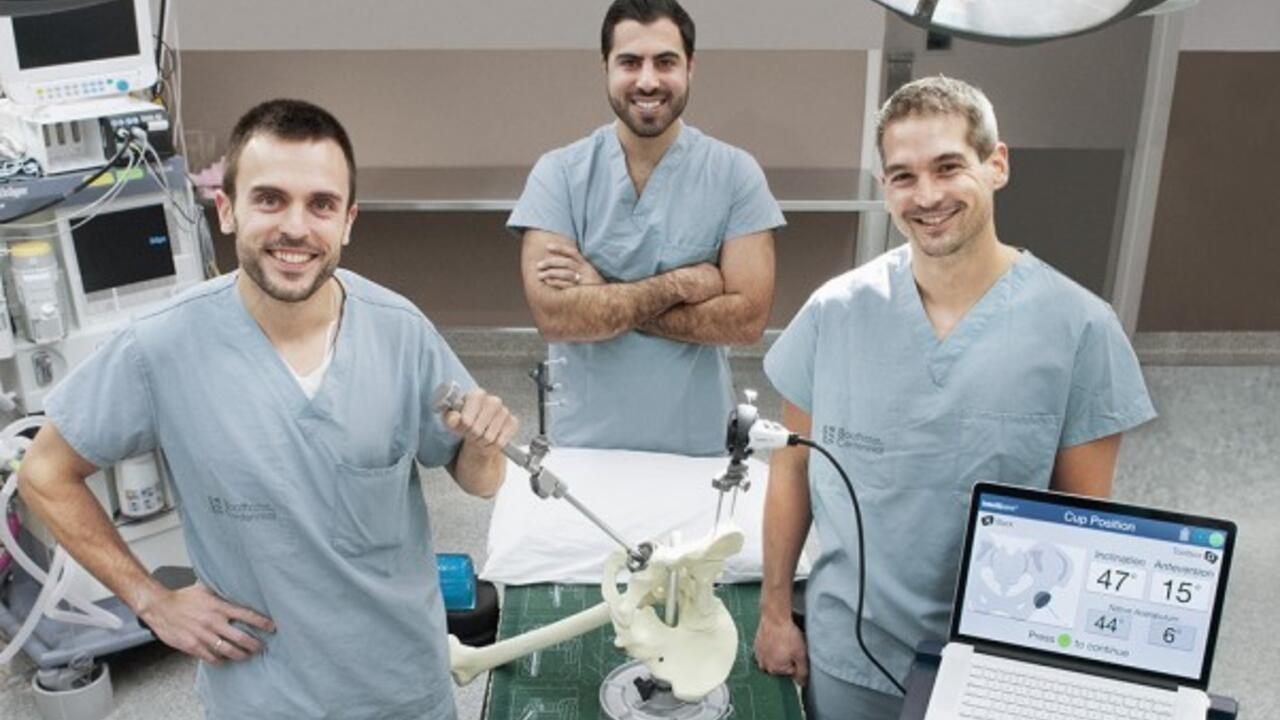
Capstone Design project leads to surgical smart tool
Three mechatronics engineering alumni co-found Intellijoint Surgical Inc.

Three mechatronics engineering alumni co-found Intellijoint Surgical Inc.
By Shane Schick Faculty of EngineeringMost parents are probably happy if their children graduate from university and get a job, but since Armen Bakirtzian (BASc ’08 Mechatronics) left the University of Waterloo’s mechatronics engineering department he has managed to co-found a company that could improve hip replacement surgery all over the world, helping untold numbers of surgeons — including his own father.
Working alongside his mechatronics classmates Richard Fanson (BASc ’08 Mechatronics) and Andre Hladio (BASc ’08 Mechatronics; MASc 2011 Electrical & Computer), Bakirtzian has been leading Intellijoint Surgical Inc., a medical technology company that has commercialized their fourth-year Capstone Design project.
The company’s first product, intellijoint HIPTM, is a surgical smart tool that enables accurate implant positioning and selection that can assist in the prevention of hip instability, dislocations, unequal leg lengths, and other complications including the potential for revision surgery. intellijoint HIP uses a combination of hardware and software to calculate implant angles and position using sensors.
US Food and Drug Administration clearance of the next generation of intellijoint HIP was announced on January 7, 2016. The first generation product was awarded a Health Canada licence in late-2013 and received U.S. FDA approval in mid-2014. intellijoint HIP was developed with an advisory board of surgeons and has been used in over 300 procedures across the US & Canada.
“The (business) strategy is both a push and a pull,” he said. “We attend orthopaedic conferences and showcase the technology at annual meetings like the American Academy of Orthopedic Surgeons. Our technology has been exposed to a lot of different crowds and appeals to many audiences from surgeons specializing in hip and knee replacements to surgeons in specialties outside of orthopaedics. Our scientific advisory board also presents clinical study outcomes and publications at more academic-style conferences.”
Of course, the idea of innovation through sensor technology has taken off with discussions about the “Internet of Things,” but Bakirtzian notes that Intellijoint is meeting an entirely different set of standards than what you might find in the “smart home” of the future.
“We developed a novel sensor and that’s a fun trend to be a part of, but I think where we’re differentiated is in how we meet the strict requirements in the medical industry for sensors, which includes not only how they’re designed but the usability, longevity, quality control and surgical workflow integration that is required to be successful in this market” he said. “
Bakirtzian said his experience in bringing Intellijoint to market has coincided with a growing recognition that the next generation of engineers training at the University of Waterloo may be as likely to launch their own venture as they are to join a more established firm.
“We didn’t graduate too long ago, and I think the whole feeling at UW has made a 180 when it comes to entrepreneurship,” he said. “When my co-founders and I went to school there, you didn’t hear the term entrepreneurship. I am fortunate enough to go back to campus now, and it’s unbelievable how prevalent it is.”
The most important thing for current and future engineering students, Bakirtzian said, is to use their time in university to learn how to learn, and them apply that in whatever they pursue.
“Entrepreneurship is often about being presented with a problem and being able to navigate through that to provide value to a customer, whoever that may be,” he said. “Those aren’t always things that engineers are exposed to right away, but at the end of the day their training helps them to be able to design innovative solutions that are addressing the needs of customers and a gap in the marketplace.”

Read more
How Doug Kavanagh’s software engineering degree laid the foundation for a thriving career in patient care

Read more
Upside Robotics secures new funding to accelerate the future of sustainable farming

Read more
Redefining capstone learning by bringing students, faculty and community partners together to tackle real-world challenges
The University of Waterloo acknowledges that much of our work takes place on the traditional territory of the Neutral, Anishinaabeg, and Haudenosaunee peoples. Our main campus is situated on the Haldimand Tract, the land granted to the Six Nations that includes six miles on each side of the Grand River. Our active work toward reconciliation takes place across our campuses through research, learning, teaching, and community building, and is co-ordinated within the Office of Indigenous Relations.